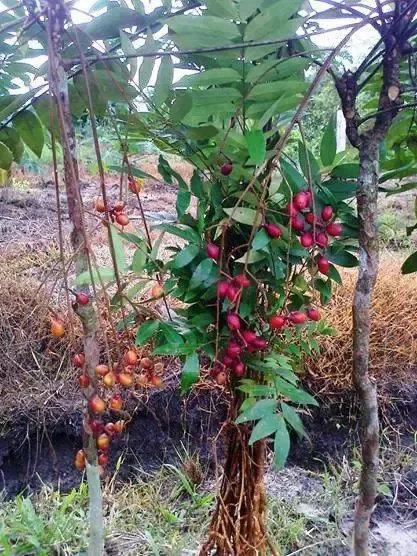Pasak Bumi: Borneo’s Masculine Coffee That Will Leave You Curious and Addicted
 |
| Pasak Bumi Coffee in ready-to-serve packaging —just open, pour into a glass with hot water— showcases Malaysian creativity. Author's documentation. |
BORNEOTRAVEL - KUCHING: If you’re traveling, on a business trip in Kuching, Sarawak - Malaysia or in the border regions between Indonesia and Malaysia, don’t miss this: pasak bumi coffee.
What is "pasak bumi"?
This Bornean plant is similar to Korean Ginseng or Chinese Tea—natural, healthy, and beneficial.
Pasak bumi: Borneo's endemic rainforest treasure
Pasak bumi (Eurycoma longifolia) is a remarkable plant endemic to the lush tropical rainforests of Borneo. This region, known for its rich biodiversity, provides the ideal environment for pasak bumi to thrive.
The Borneo rainforest, with its dense canopy and vibrant ecosystem, is home to a myriad of plant and animal species, making it a treasure trove for botanists and herbalists alike.
The rainforests of Borneo are not just beautiful—they are a vital part of the planet's ecological balance. The complex network of trees, vines, and undergrowth creates a microhabitat that supports the growth of pasak bumi. This plant, often found in the wild under the towering forest giants, has adapted to the humid, shaded conditions of the rainforest floor.
There are many products made from pasak bumi
There are many products made from pasak bumi. You can find it in tea bags and sachets of coffee. If you visit Sebatik, you’ll see it prominently featured.
What we admire about Malaysia is their knack for seizing opportunities. While I was still planting and cultivating pasak bumi, they had already turned tongkat ali into a premium commodity.
Modern processed tongkat ali coffee is now available on the international market, showcasing their ability to innovate and market this unique plant.
I want to delve deeper into Malaysia’s creativity and their success with this plant.
For a long time, I had the intention of making Eurycoma longifolia a valuable economic plant, a commodity. In Malaysia, it’s known as tongkat ali, symbolizing male vitality and strength.
In 2014, I planted 1,000 trees. In West Borneo, the roots are mostly used for tea bags or in cups that can be filled with hot water for immediate consumption.
Pasak bumi is believed to enhance male potency
Pasak bumi is believed to enhance male potency, and it has become a widely traded commodity. Finding it is no easy task; it requires determination and courage.
Once you locate it, pulling it out requires facing the back of the tree. Interestingly, to harvest pasak bumi, one must observe certain taboos and rituals.
 |
| Morphology of Pasak bumi: Its roots, trunk, fruit, and leaves. Author's documentation. |
This rare plant grows among other trees in the Borneo rainforest. Its scientific name is Eurycoma longifolia, known as tongkat ali in Malaysia, and bidara pahit in Indonesia. It doesn’t grow in clusters but rather stands alone, which makes spotting it challenging. Its elusive nature means that finding it is often a matter of luck and perseverance.
The trunk of the pasak bumi tree is relatively small. Even a specimen the size of a thumb is valuable.
Some trees can grow as large as a calf, but the largest ones are about the size of an adult thigh. Despite its size, don’t be fooled—extracting this plant is incredibly difficult. The roots extend deep into the ground, and without the proper technique, you might completely fail to obtain it.
Malaysia’s opportunistic market success
What I truly admire about Malaysia is their swift ability to capitalize on opportunities. While I was still in the process of planting and cultivating, they had already succeeded in making tongkat ali a sought-after commodity. Today, modern processed tongkat ali coffee is freely available on the international market.
In Sebatik, you can purchase it easily. A packet containing 15 sticks costs around IDR 80,000.
Drinking it on the spot costs IDR 8,000 per cup, while in Jakarta, it can be sold for approximately IDR 20,000 per cup. This reflects not only the high value placed on pasak bumi but also the ingenuity of turning a rainforest treasure into a global commodity.
-- Masri Sareb Putra





